Find the perfect character witness letter template from our collection of 20+ powerful examples. Get expert tips and see what makes a great reference.
Imagine your friend or family member is in trouble with the law. Deep down, you know they’re a good person, but how do you convince a judge to see that, too? That’s where a character witness letter comes in!
These letters are like a “good person report card” for someone facing legal issues. They can be used in serious court cases, parole hearings (when someone in prison applies for early release), and even custody battles.
A powerful character witness letter goes beyond just saying someone is nice. It paints a picture of their best qualities and why the judge should give them a second chance. Ready to learn how to write one that makes a difference?
Who Should Write a Character Witness Letter?
The most potent character witness letters come from people who genuinely know and believe in the person they support. Here’s a breakdown of why certain people might be good choices:
- Close Friends and Family: You know the person on a deep level. You’ve seen their good and bad sides and still believe in them. But remember, be honest! For example, if the person struggles with anger, don’t pretend they don’t. Please explain how you’ve seen them working to improve or manage those issues.
- Employers or Coworkers: These references focus on work habits and reliability. Can the person be trusted to show up on time, do their job well, and get along with others? If you’re the person’s boss, it also shows your belief in their potential to change and improve.
- Teachers or Mentors: Teachers can speak to a person’s character development over time. The person was immature in the past but has shown real growth and responsibility. Mentors, like coaches or youth group leaders, see how someone interacts with others and handles challenges.
- Respected Community Members: This could be a religious leader, a well-known volunteer, or someone else the court might respect. Their reference confirms that the person isn’t just good around their close circle but contributes positively to the community.
Types of Character Witness Letters
Character witness letters aren’t just for one situation. Here’s where you might see them:
- Court Cases: These are the most common. A good letter might help the judge decide on a lighter sentence in criminal court. It can also be important in family court cases, like when parents argue over who should get custody of a child.
- Parole Hearings: Someone in prison might try to get out early on parole, which means they promise to follow strict rules after release. A character witness letter can show the parole board that the person has support and is serious about changing their life.
- Immigration Proceedings: Sometimes, when people try to immigrate (move) to a new country, officials want to ensure they’re good citizens. A character reference letter can be one way to prove this.
- Job or School Applications: This is less usual, but sometimes, a job or school might specifically ask for a character reference. This is different from a professional reference who talks about your work skills.
What Changes Based on the Type?
The main idea of a character witness letter stays the same, but you might adjust a few things depending on the situation:
- Seriousness: A letter for a severe court case should be more formal than one helping with a friend’s job search.
- The Focus: In court, focus on qualities that show the person could be a good and law-abiding citizen. For a job or school, focus on traits like work ethic, dependability, and how they work with others.
What to Put in a Character Witness Letter
Think of your character witness letter as building a case for why the person is worthy of trust. Here’s how to lay it out:
The Basics: Start Strong
- Proper Formatting: Think of this like a super-important school assignment. It needs your name, address, date, and the proper heading (like “To the Honorable Judge Smith”). This shows you take it seriously.
- Clear Intro: Start with a sentence like, “My name is [your name], and I’ve known [person’s name] for [number] years as their [friend, teacher, coworker, etc.]
Show Their Good Side: It’s All About the Details
- Don’t Just List Traits: Saying someone is “kind” is okay, but it’s boring! Instead, describe a time they showed kindness. Maybe they helped a new student at school or always offered to walk an elderly neighbour’s dog.
- Focus on What Matters: If the person is in court, think like a lawyer. Highlight traits like responsibility (do they show up on time?), trustworthiness (do they keep promises?), or work ethic (are they a good employee?).
- Be Specific: The more detailed, the better. Instead of “Sarah is always helpful,” try “When my car broke down, Sarah drove me 30 miles to work without hesitation.”
Mention the Legal Issue (Briefly): Don’t Ignore It
- Acknowledge, Don’t Excuse: Briefly mention that you know about the person’s legal trouble. Something like, “I understand [person’s name] has made mistakes…”
- Shift the Focus: But the main part is about their good character. “…but through everything, I’ve seen their determination to turn things around.”
Why Character Witness Letters Matter
You might think a judge only cares about laws and evidence, but that’s not the whole picture! Judges are people, too, and they have a tough job. Here’s why your letter could make a big difference:
- Showing the Whole Person: When someone is in legal trouble, the court mostly sees the bad stuff they did. A character letter paints a fuller picture of who they are – the good parts along with the mistakes.
- It’s About Potential, Not Just the Past: Maybe the person messed up, but a strong letter helps the judge see their potential for change. It can show they have support to become a better version of themselves.
- Fairness Matters: Think of it like this: If two people commit the same crime, but one has a family, a job, and people who believe in them, shouldn’t that count for something? Character letters help the judge decide what’s truly fair.
- Communities Need Good People: Sometimes, the best outcome isn’t just punishment. If the person can get help, learn from their mistakes, and become a productive member of society, that’s good for everyone, and your letter can be part of making that happen.
20+ Powerful Character Witness Letter Templates
There are many templates to help get you started.
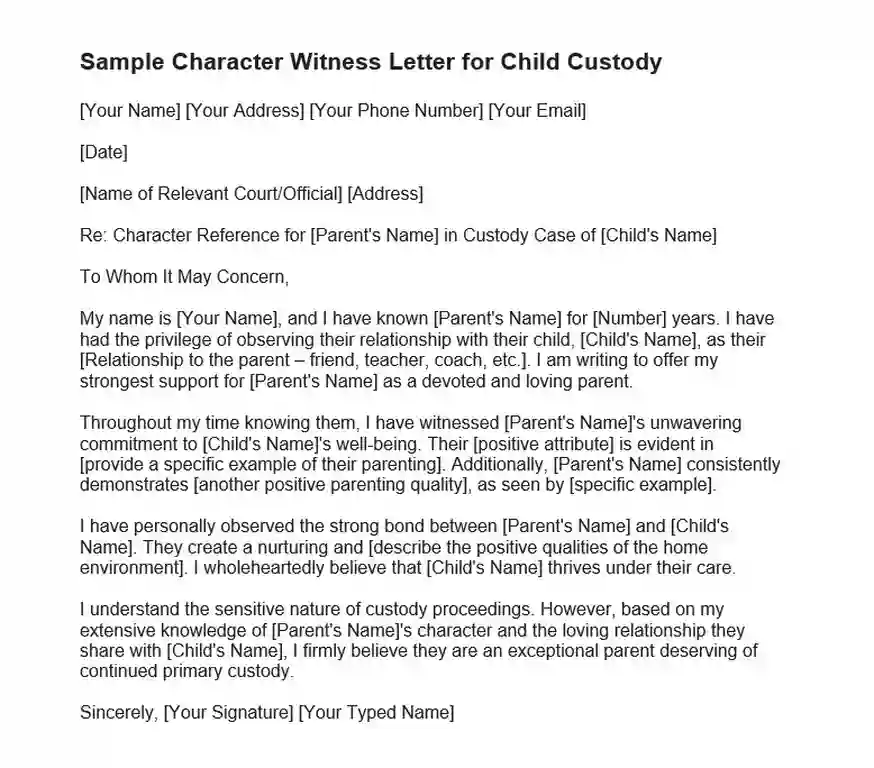
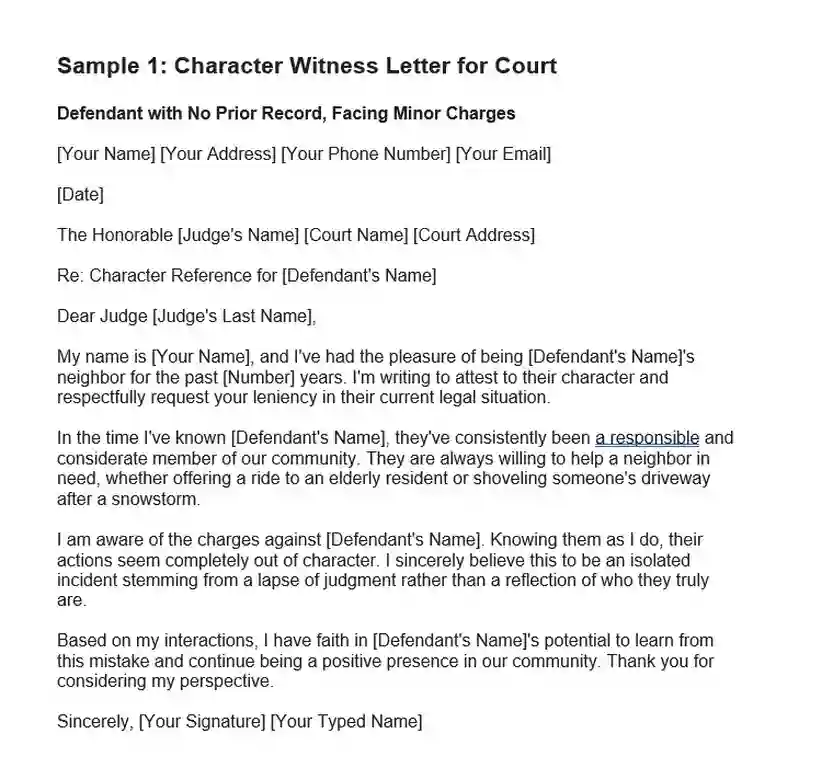
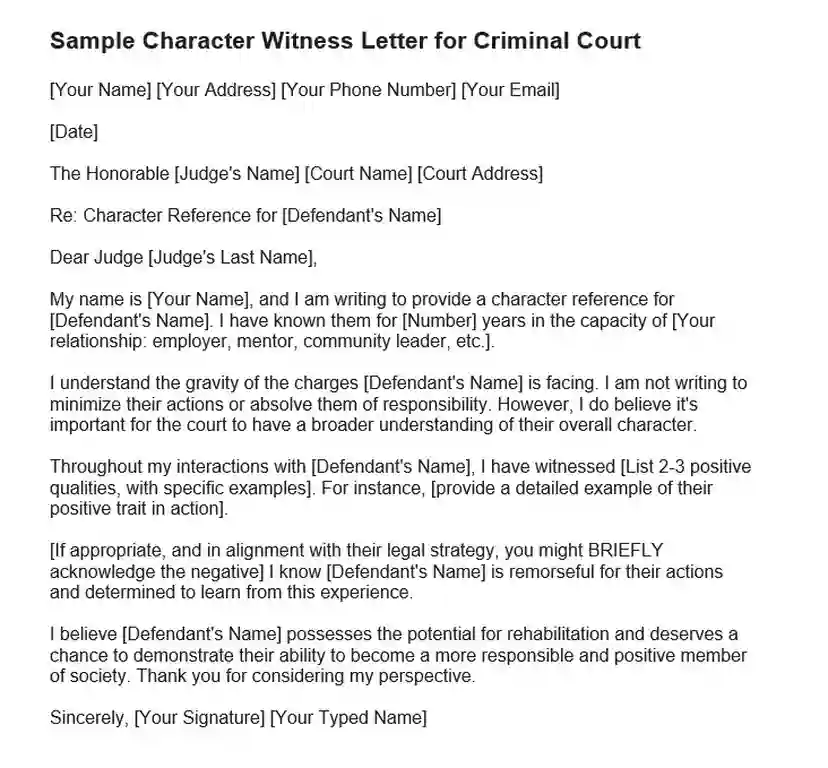
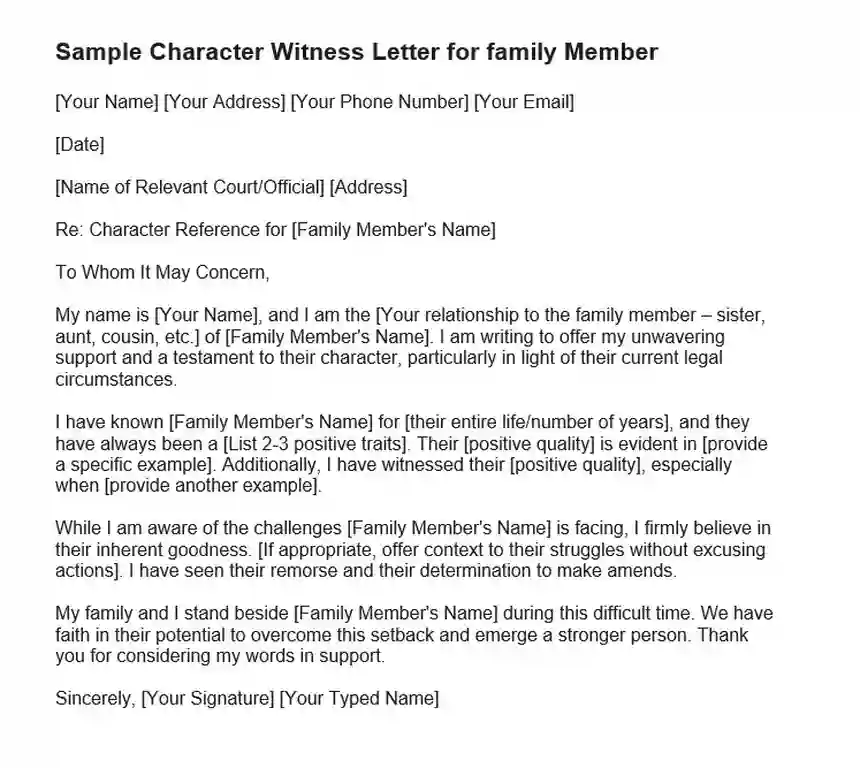
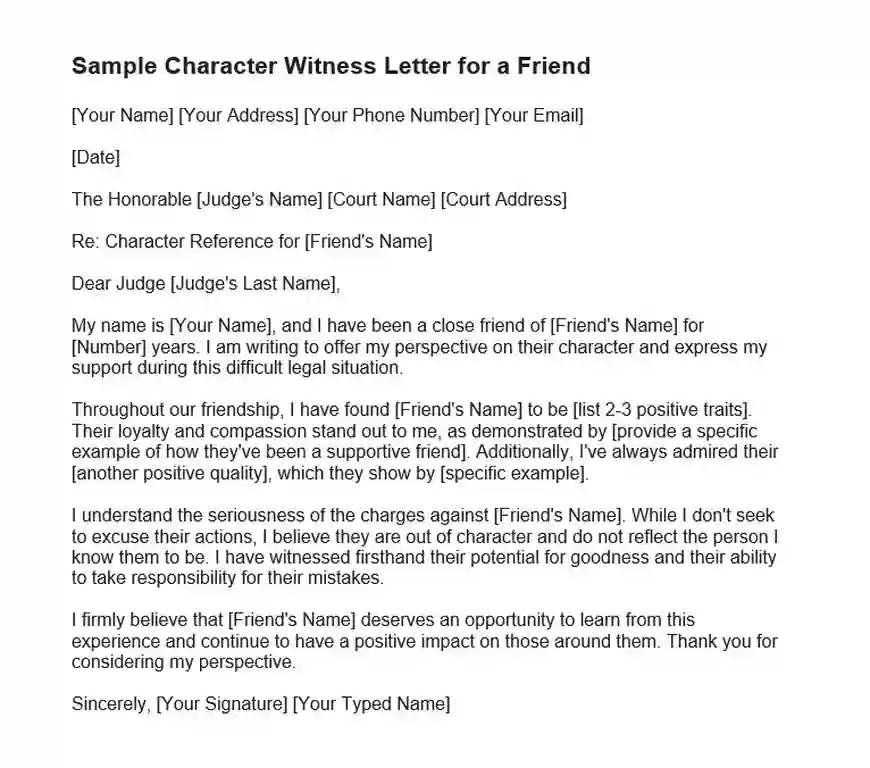
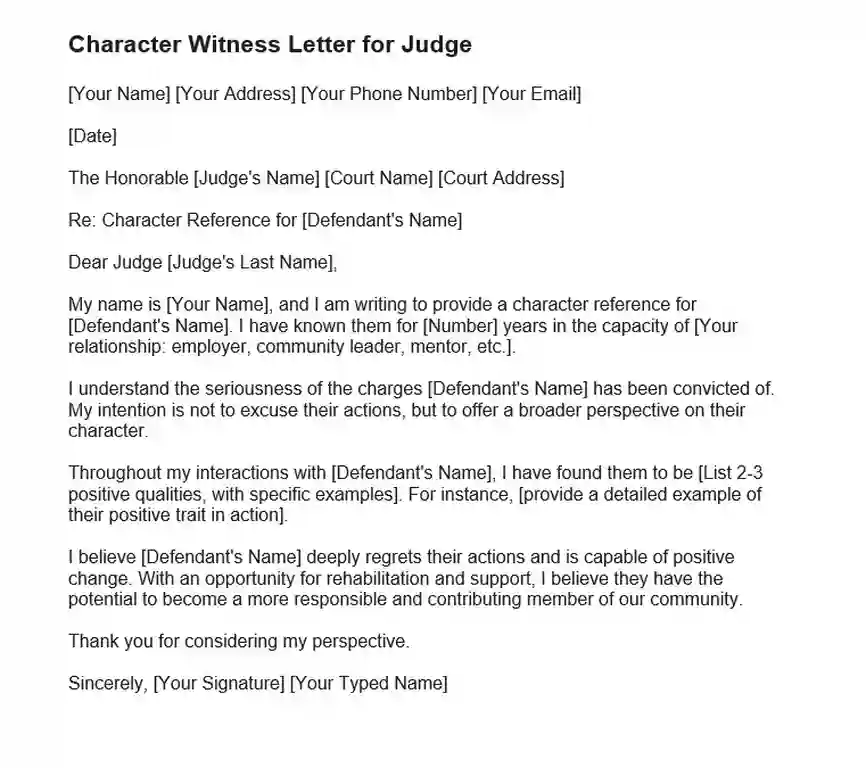
Character Witness Letter Examples
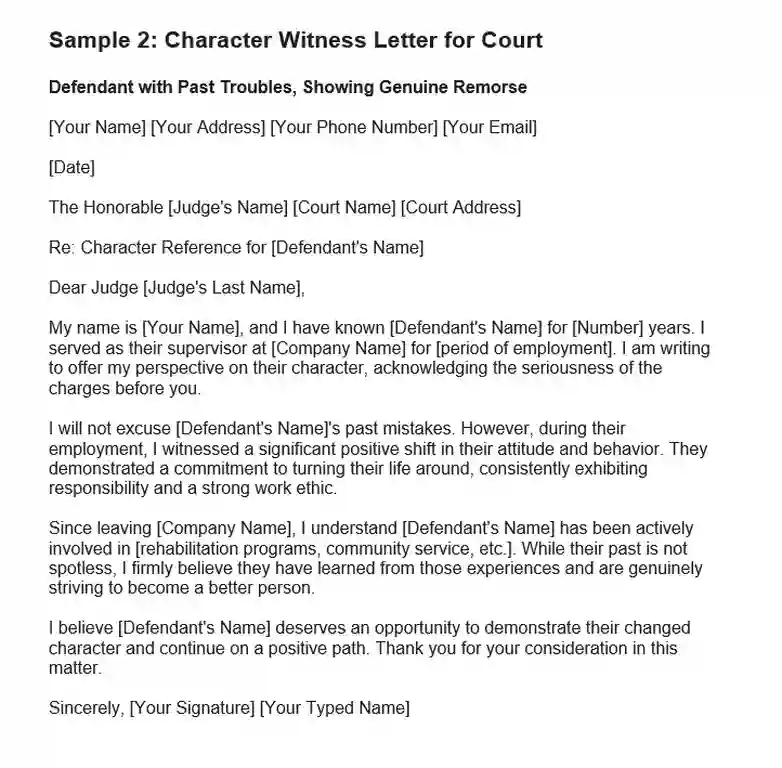
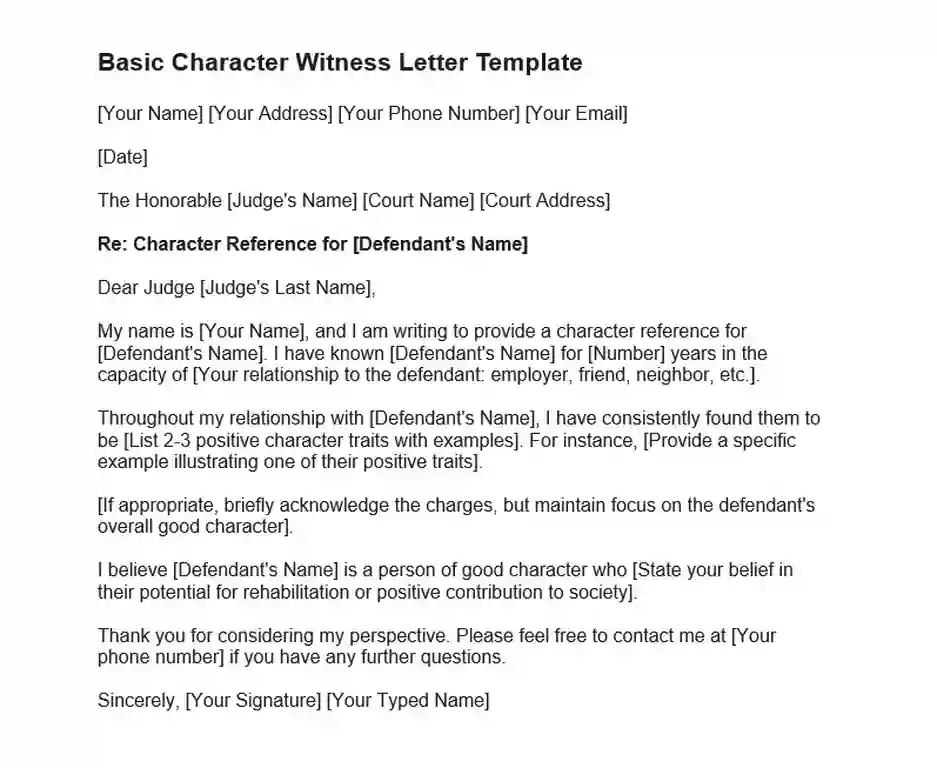
Tips to Make Your Letter Stronger
Remember, change them to fit your specific situation. Here are some extra tips:
- Be Real: The Worst Thing You Can Do Judges and lawyers can spot fake praise a mile away. It’s much better to be honest about a person’s flaws but show you believe they are genuinely trying to change.
- Focus on the Good: Think Like a Superhero What is this person’s “superpowers” when it comes to their personality? Are they super loyal, always willing to lend a hand, or the most determined person you know? Those are the things to showcase!
- Don’t Just Tell, Show! Stories are Powerful. Instead of just saying, “Michael is responsible,” tell about the time he volunteered to organize the school fundraiser even though he was already super busy with sports. Actions speak louder than words!
- Be Professional: This Isn’t a Text to Your Bestie. Use correct spelling and grammar, and avoid slang. Imagine you’re writing a really respectful email to a teacher. Ask a parent, older sibling, or even a teacher to read it over and help polish it up.
Extra Things to Know
Submitting Your Letter: Each court might have its own rules for submitting a character witness letter. Here’s what to find out:
- Should you mail it directly, or does the person’s lawyer bring it to court?
- Are there deadlines for when the letter needs to arrive?
- Is there a specific format they prefer (like a digital copy or a paper one)?
Be Prepared: There’s a chance the judge or lawyer might call you as a witness. This just means you’ll go to court and answer questions under oath about what you put in your letter. Don’t panic! Here’s how to get ready:
- Reread your letter so everything is fresh in your mind.
- Practice speaking clearly and calmly (pretend you’re giving a presentation in class).
- Remember, you’re not on trial – just be honest and stick to what you know about the person.
Common Mistakes In Character Witness Letters (And How to Fix Them!)
Even with the best intentions, it’s easy to slip up when writing a character witness letter. Here’s a breakdown of the biggest mistakes and how to steer clear of them:
Mistake #1: It Sounds Like Bragging
- Problem: Saying the person is “the best,” “perfect,” or has never messed up makes it unbelievable.
- The Fix: Focus on improvement. Instead of “Jenny is the most honest person ever,” try “Jenny used to struggle with telling the truth, but I’ve seen her work really hard to become someone I can trust.”
Mistake #2: Blaming Others
- Problem: Saying things like “It wasn’t his fault” or “She only did it because of bad friends” undermines the point of the letter.
- The Fix: It’s okay to explain tough situations, but focus on your friend taking responsibility now. Example: “While he made poor choices in the past, I believe those experiences made him realize the importance of…”
Mistake #3: Attacking the System
- Problem: Lines like “This whole trial is unfair” or “The laws are stupid” won’t help your friend’s case.
- The Fix: Judges care about respect! Focus on the positive qualities that make the person deserving of another chance, not bashing the legal system.
Mistake #4: Too Vague
- Problem: Saying “he’s a good guy” is nice but not convincing!
- The Fix: Use those storytelling skills! “A good guy” is boring, but “He stayed up all night helping me study for my toughest test” is powerful.
- Phrases like “pillar of the community” or “heart of gold” are red flags for AI detectors. Get creative with your descriptions!
The Power of a Good Letter
A well-written character witness letter can make a difference. It shows the judge that the person has support and people who believe in them. If you care about someone in trouble with the law, consider taking the time to write them a letter.
FAQs: Character Witness Letter Templates
How long should my character witness letter be?
Aim for concise and impactful. Ideally, keep it to one page. Two pages at most if you have several compelling examples to illustrate the person’s character.
Should I get my character witness letter notarized?
It depends. Some courts may require notarization to verify your identity and signature. Consult with an attorney or check the court’s specific guidelines to be certain.
Can I submit a character witness letter if I don’t know the defendant very well?
It’s best not to. If you can only offer vague or generic statements about their character, your letter won’t have much impact and could even be detrimental.
How do I submit my character witness letter to the court?
There are usually a few options:
- Defendant’s Attorney: The most common way. Their attorney gathers letters and presents them to the court.
- Directly to the Judge: Some courts allow you to send it by mail or deliver it in person, addressed to the judge overseeing the case.
- During Testimony: In certain situations, you might be asked to read your letter aloud in court as a form of character testimony.
Should I ask the defendant or their attorney for guidance before writing the letter?
Yes! They provide insights into what the judge might be looking for and help you focus your letter on the most relevant aspects of the person’s character.
Can a character witness letter make a difference in sentencing?
It can potentially make a difference. While judges consider many factors, a well-written letter offering a positive perspective can create a more nuanced picture of the defendant. It might influence sentencing decisions or lead to alternative rehabilitation options.
What if I’m asked to write a character witness letter but have mixed feelings?
Honesty is crucial. If you genuinely believe in the person’s character, write a strong letter. If you have reservations or concerns, it’s perfectly acceptable to politely decline the request. A half-hearted letter does more harm than good.
Are there other ways to support someone besides writing a character witness letter?
A: Absolutely! Here are some ideas:
- Attend court hearings: Your presence shows support for the defendant.
- Offer practical help: Assistance with childcare, transportation, or errands if they’re facing legal difficulties.
- Be emotionally present: Listen without judgment and offer encouragement throughout their legal process.

The content creator team at calipsotree.com is dedicated to making topics accessible to everyone, with over 9 years of experience in writing and breaking down complex concepts into easy-to-understand articles that answer readers’ financial questions.








